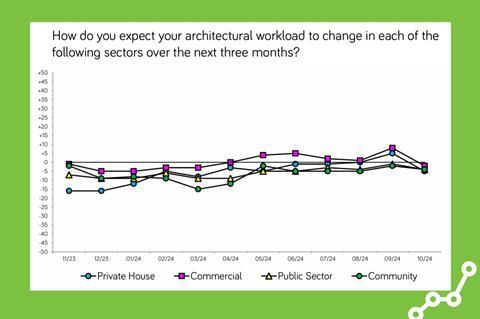October has seen rising pessimism across workloads and recruitment compared to the previous month
Architectural staff recruitment fell back in October while overall industry confidence took a hit, according to RIBA’s monthly outlook survey.

The most recent RIBA Future Trends staffing index shows that 81% of surveyed firms expect their number of permanent staff to plateau over the next three months, with 9% of practices expecting an increase and the same number anticipating job cuts.
Although small practices returned a -2 staffing figure, medium and large companies expect growth with a +13 index number.
In London, staffing outlook remains positive, despite falling from last September’s +12 balance to +4 in October. The North of England mimics this pattern, dropping from +7 to +3.
However, Wales and the West (-6) and the South of England (-3) have not fared so well, becoming negative last month.
Despite the “increasingly cautious” approach to recruitment, views on near-term workload remain just about positive, having returned a +2 balance.
The sector toes the line, as 23% of firms expect workloads to decrease versus 24% that anticipate growth. Optimism is strongest in the North of England, the only region anticipating private housing workloads to pick up.
Views on private housing turned negative overall, with a ten-point index drop from September (+5) to October (-5).
The commercial sector has garnered similar opinions as the workload figure has also experienced a ten-point fall from +8 to -2.
Meanwhile, outlooks for the public and community sectors have further deteriorated.
The outlooks of small and larger companies on future work continue to “differ sharply” with smaller firms expressing pessimism whereas bigger practices are hopeful.
Current workloads are also 10% lower than twelve months ago.
October’s Future Trends data was collected before the UK’s budget announcement on 30 October and saw practices reporting projects being put on hold as the supply chain awaited the news as well as reluctant attitudes towards commissioning and tendering higher-risk building projects.
















1 Readers' comment